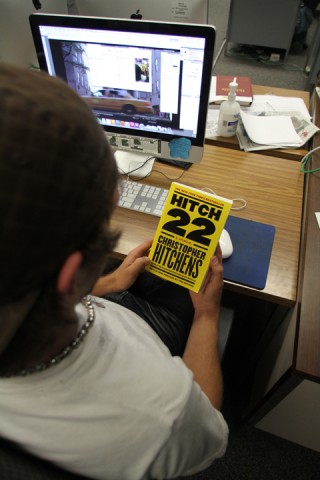
Atheists, agnostics don’t find life at Christian university drastically different
By Rob Bradfield
Reporter
It can be hard fitting in at a university where many of the people you meet believe you’re going to burn in hell.
Baylor, the world’s largest Baptist university, has a diverse student body with a range of religious beliefs. In its mission statement, the university outlines its goal to integrate “academic excellence and Christian commitment within a caring community.”
While Baylor works to ensure that students of all beliefs are treated equally, atheists and agnostics are a minority on campus.
Only 43 out of 14,900 students identified themselves as atheists, according to a fall 2010 report prepared by the Office of Institutional Research and Testing.
A further 371 students identified as having “No Religion” and 18 did not wish to identify. Baptists had the strongest showing at 5,287, followed by Catholics at 2,128.
For some atheists, it is the religious student culture, not the institution, that is the greatest challenge. At a school with so many students of faith, it’s almost impossible to avoid religious conversations and — especially for non-religious students — questions.
“I do feel like sometimes it’s harder for me to make friends, especially with people who ask that sort of question outright, initially, and don’t have the opportunity to get to know me better,” said one atheist student, a senior computer science major from Austin who asked to remain anonymous.
While he says he has enjoyed his time at Baylor and has a group of friends that includes several religious people, he also acknowledges one aspect of Baylor social life in which he can’t participate: “I can’t join people’s churches.”
Agnostics at Baylor face a similar situation.
One student, an agnostic senior from Sugar Land who also wished to remain anonymous, tries to avoid the issue altogether.
“I’m not hiding out of fear or shame, although the disappointment in the most fervent Christians’ eyes is enough to make me try to reconsider,” she said.
This student said her beliefs aren’t often an issue. She, like other atheists and agnostics, doesn’t believe that there is a certain set of characteristics that sets her apart from anyone.
“It’s not like being a ‘Baylor girl’ in Sperrys and Nike shorts,” she said.
She later admitted to wearing both.
These two students, like many other atheists and agnostics, felt uncomfortable publicly identifying themselves.
The Austin computer science major said in the past he has been more open about his atheism, but has recently backed off.
“The majority of people choose to judge me based on that [atheism] before they meet me, and I’d rather that not be the case — it’s kind of annoying,” he said.
Round Rock senior Erik Remkus has found another solution.
Remkus is the vice president of the Agnostic/Atheist Society, an unofficial student organization that gives atheists and agnostics a place to come together and socialize.
The organization meets from 9-11 p.m. every Monday and from 5:30-7 p.m. on Thursdays at Common Grounds. The group is open to any student that wants to participate, including students of faith.
Members come together to discuss a wide range of topics and support each other.
“It’s mostly nice to talk with some like-minded people,” Remkus said.
One of the challenges the group faces is finding possible members.
“There’s only so much that we can do because we can’t do the advertising — that’s the big thing,” Remkus said, “and in a very Christian-heavy environment, it is kind of odd to be like, ‘Hello, are you an atheist?’ You just can’t do that.”
Even with the support group, some members are reluctant to be open about their atheism. The Agnostic/Atheist Society’s Facebook group is closed and private, and some atheists choose not to broadcast their beliefs because of the possibility of tension with members of the faculty or student body.
Some atheists hold work-study jobs and participate in other university programs, and have found that religion, or lack of religion, isn’t a problem.
“When I worked for the physics department for two years, they did not know [about my beliefs]. It just never came up, but I suspect for some, they feel that it could be an issue,” Remkus said.
Lori Fogleman, director of media communications at Baylor, said atheists and agnostics at Baylor aren’t going to feel any official pressure.
“We have no policy on atheist students, but Baylor makes no secret about its mission or its values,” Fogleman said. “Who we are is readily apparent on our website, in our materials and in our student recruitment visits.”
But for the most part, students that identify as atheist or agnostic aren’t any different from the rest of the student body. They don’t mind chapel or the required religion classes any more than the average Baylor student. They go to class, football games and campus events.
At a religious institution whose mission is to educate “responsible citizens, educated leaders, dedicated scholars and skilled professionals,” atheists and agnostics are just another part of the community.






